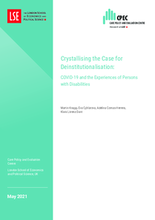Millions of persons with disabilities, children and older persons live in congregate settings. Whilst the motivation for providing such care may be well-intentioned, that is not always the case. Many of those settings are ‘institutional’, with residents denied autonomy and choice, provided with poor quality health and social care, and experiencing social isolation, neglect or abuse. The COVID-19 pandemic has highlighted many of those failings, whilst at the same time exposing residents to disproportionate risks of infection, severe illness and premature death. This research addresses the following four questions:
- What is the situation today in relation to institutionalisation of persons with disabilities and older persons?
- What has been the impact of COVID-19 on institutional care? How have governments responded?
- What are the arguments for deinstitutionalisation?
- What policy and other measures can be and are being taken to shift the balance of support from institutional care to community-based services?
This report summarises the evidence and experiences of persons living in congregate settings in general, and in terms of the impact of COVID-19, to understand the barriers to deinstitutionalisation, and to highlight the approaches that have sought to overcome those barriers. It considers all disabilities and long-term conditions that might lead to institutionalisation, for all age groups across the world.

